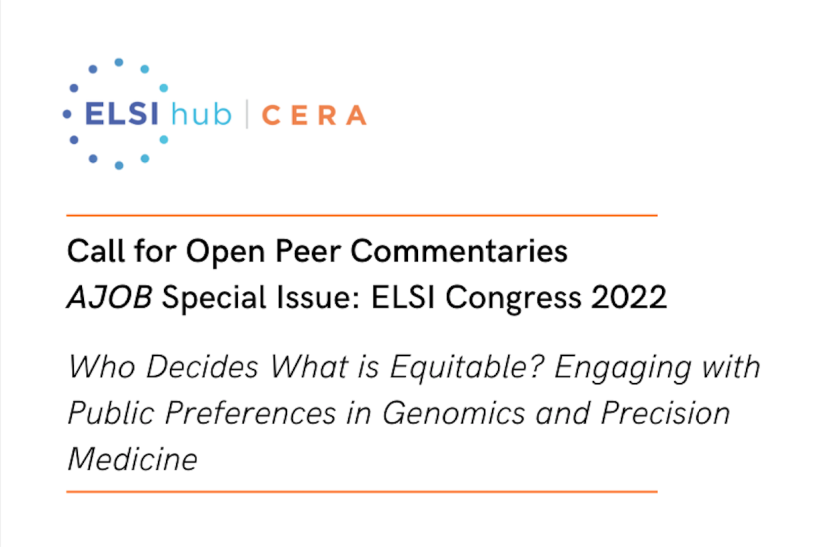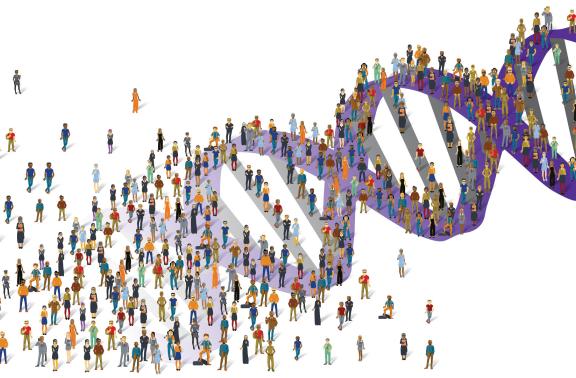
AJOB Seeks Open Peer Commentaries for the ELSI Congress 2022 Special Issue
We are pleased to announce that five articles have been accepted for publication in the special ELSI Congress 2022 issue of the American Journal of Bioethics (AJOB): Who Decides What is Equitable? Engaging with Public Preferences in Genomics and Precision Medicine.
At this time, the journal welcomes proposals for Open Peer Commentaries (OPCs) written either in response to the article(s) below or on the issue topic as a whole. You can submit your OPC proposal of roughly one paragraph by Friday, March 17th via the AJOB Editorial site.
Author Instructions:
The journal will evaluate your proposal and contact you via email to inform you whether your proposal has been selected to be submitted as a full Open Peer Commentary. Full OPCs are due Tuesday, April 4th.
OPCs are typically between 500-1500 words and contain no more than 10 references. A guide to writing an Open Peer Commentary is available under the Resources section "Instructions and Forms" at https://mc.manuscriptcentral.com/uajb. Authors are typically limited to one OPC per journal issue.
To help you decide whether or not you will be an appropriate commentator for these forthcoming Target Articles, you may consult the abstracts below and access the complete articles on the the AJOB Editorial site
Abstracts:
"The Promise and Reality of Public Engagement in the Governance of Human Genome Editing Research" by John M. Conley et al.
This paper analyses the activities of five organizations shaping the debate over the global governance of genome editing in order to assess current approaches to public engagement (PE). We compare the recommendations of each group with its own practices. All recommend broad engagement with the general public, but their practices vary from expert-driven models dominated by scientists, experts, and civil society groups to citizen deliberation-driven models that feature bidirectional consultation with local citizens, as well as hybrid models that combine elements of both approaches. Only one group practices PE that seeks community perspectives to advance equity. In most cases, PE does little more than record already well-known views held by the most vocal groups, and thus is unlikely to produce more just or equitable processes or policy outcomes. Our exploration of the strengths, weaknesses, and possibilities of current forms of PE suggests a need to rethink both “public” and “engagement.”
"Rare Disease, Advocacy and Justice: Intersecting Disparities in Research and Clinical Care" by Meghan C. Halley et al.
Rare genetic diseases collectively impact millions of individuals in the United States. These patients and their families share many challenges including delayed diagnosis, lack of knowledgeable providers, and limited economic incentives to develop new therapies for small patient groups. As such, rare disease patients and families often must rely on advocacy, including both self-advocacy to access clinical care and public advocacy to advance research. However, these demands raise serious concerns for equity, as both care and research for a given disease can depend on the education, financial resources, and social capital available to the patients in a given community. In this article, we utilize three case examples to illustrate ethical challenges at the intersection of rare diseases, advocacy and justice, including how reliance on advocacy in rare disease may drive unintended consequences for equity. We conclude with a discussion of opportunities for diverse stakeholders to begin to address these challenges.
"Bounded Justice, Inclusion, and the Hyper/Invisibility of Race in Precision Medicine" by Kadija Ferryman
I take up the call for a more nuanced engagement with race in bioethics by using Creary’s analytic of bounded justice (Creary 2021). My claim is that bounded justice helps illuminate processes of racialization, or racial formation, specifically Blackness, as a dialectical processes of both invisibility and hyper-visibility. This dialectical view of race provides a lens through which the ethical, legal, and social implications (ELSI) of genetics and genomics field can reflect on fraught issues such as inclusion in genomic and biomedical research that is complementary to justice theories. This is a way to add nuance to the ELSI scholars’ theoretical toolkit for engaging with race and racism.
"Is it just for a screening program to give people all the information they want?" by Lisa Dive et al.
Genomic screening at population scale generates many ethical considerations. One is the normative role that people’s preferences should play in determining access to genomic information in screening contexts, particularly information that falls beyond the scope of screening. We expect both that people will express a preference to receive such results and that there will be interest from the professional community in providing them. In this paper, we consider this issue in relation to the just and equitable design of population screening programs like reproductive genetic carrier screening (RGCS). Drawing on a pluralistic public health ethics perspective, we claim that generating and reporting information about genetic variants beyond the scope of the screening program usually lacks clinical, and perhaps personal, utility. There are both pragmatic and ethical reasons to restrict information provision to that which fits the stated purpose of the program.
"Promoting equality in the governance of heritable human genome editing through Ubuntu: Reflecting on a South African public engagement study" by Bonginkosi Shozi & Donrich Thaldar
In a recent public engagement study on heritable human genome editing (HHGE) conducted among South Africans, participants approved of using HHGE for serious health conditions – viewing it as a means of bringing about valuable social goods – and proposed that the government should actively invest resources to ensure everyone has equal access to the technology for these purposes. This position was animated by the view that future generations have a claim to these social goods, and this entitlement justified making HHGE available in the present. This claim can be ethically justified in the Ubuntu ethic (deriving from South Africa) as it (a) emphasizes the interests of the community, and (b) espouses a metaphysical conception of the community that transcends the present generation and includes past and future generations. On this basis, a compelling claim can be made on behalf of prospective persons in favour of equal access to HHGE.


